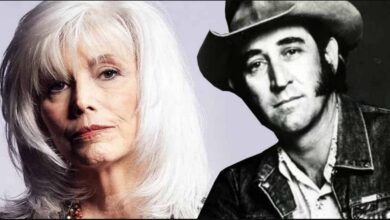Freddy Penned This Song In 1956, And It Finally Rose To Fame In The 70s; You Made It, Freddy!
Freddy Fender, born as Baldemar Garza Huerta on June 4, 1937, in San Benito, Texas, is an iconic figure in the landscape of American music, particularly known for his unique fusion of country and Tejano styles. His early life was steeped in the sounds of the border region, where the rhythms of Mexican folk music intertwined with country twang. Growing up in a bilingual environment, Fender’s fascination with music began at an early age, inspired by the traditional songs of his heritage and the country music that permeated the airwaves.
Fender’s initial foray into the music world began in the 1950s, when he adopted the stage name “Freddy Fender” and recorded his first single, “Wasted Days and Wasted Nights.” However, his early promise was abruptly curtailed by legal troubles that led to a prison sentence for a marijuana possession charge. This setback left him in a precarious position within the music industry, as the song failed to garner the attention it deserved and Fender faded into relative obscurity during those years.
The tide turned for Fender in the 1970s, a decade that would redefine his career and reveal his immense talent to a broader audience. In 1974, he released “Before the Next Teardrop Falls,” which skyrocketed to No. 1 on the Billboard Hot 100 chart. This achievement marked the beginning of a renaissance for Fender, whose music connected deeply with listeners, transcending cultural and geographical barriers. His ability to blend heartfelt lyrics with catchy melodies and a rich vocal delivery allowed him to become a beloved figure among fans of various musical backgrounds.
Building on his newfound fame, Fender re-recorded “Wasted Days and Wasted Nights” in 1975. This rendition, which showcased his signature style, quickly climbed to the top of the charts, claiming the No. 1 spot on the Billboard Country chart and No. 8 on the Billboard Hot 100. The song’s compelling narrative about love lost resonated deeply with many, and it became synonymous with Fender’s name. This revival of interest not only brought accolades to Fender but also highlighted the importance of resilience and reinvention in the face of adversity.
Throughout the late 1970s and into the 1980s, Fender enjoyed continued success with a string of hits that solidified his position in country and Tejano music. His contributions to both genres helped to bridge gaps between communities, further enriching the tapestry of American music. Songs such as “Learnin’ to Fly” and “Lo Siento, Mi Vida” reflected his diverse influences and showcased his versatility as an artist, melding traditional sounds with contemporary flair.
In addition to his commercial success, Fender was recognized for his influence on other musicians. He served as a mentor to younger artists and encouraged them to explore the rich heritage of Latin music within the context of country. His work helped pave the way for future generations of Latino musicians in America, embedding a sense of cultural pride within the country music landscape.
In 2002, Fender received a tremendous honor when he was inducted into the Texas Country Music Hall of Fame. This recognition not only celebrated his vast contributions to music but also symbolized the deep connection he fostered with his fans and peers. His legacy was further solidified by the affection with which many viewed him, not merely as an entertainer, but as a cultural ambassador who celebrated and promoted the diversity of American music.
Freddy Fender’s life story is one of triumph over adversity, and his music continues to be celebrated for its emotional depth and musical innovation. He passed away on October 14, 2006, but his legacy lives on through his timeless recordings and the impact he made on the industry. His songs, especially “Wasted Days and Wasted Nights” and “Before the Next Teardrop Falls,” remain staples on playlists and continue to evoke nostalgia and appreciation from fans around the world.
The narrative of Fender’s life, filled with both struggles and successes, serves as an inspiration to many. It exemplifies how perseverance, coupled with undeniable talent, can lead to a resurgence in the face of challenges. His music is forever etched in the hearts of those who appreciate the beauty of melody and the power of storytelling, making Freddy Fender an enduring symbol of resilience and creative spirit in the fabric of American culture.
&ab_channel=MariolaLubera





